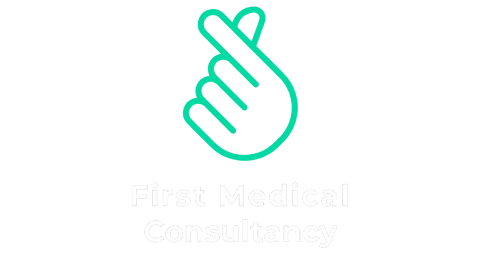Ready to kickstart your healthcare career in the Middle East? You’re not alone! With the region’s booming medical tourism industry projected to reach $28 billion by 2024, opportunities are ripe for the taking.
But where do you begin? This guide will walk you through the essentials, from degree recognition to language requirements.
I’ll share insider tips on standing out in a competitive market and reveal the unexpected skills that could give you an edge.
Whether you’re a fresh graduate or seasoned professional, get ready to navigate the exciting world of Middle Eastern healthcare.
Let’s dive in and turn your aspirations into reality!
Key Takeaways
- Assess your qualifications and experience to meet regional standards in the Middle East.
- Evaluate your educational background and ensure degree recognition by relevant authorities.
- Identify transferable skills and consider specialized certifications to enhance competitiveness.
- Research visa, licensing, and application requirements for healthcare roles in target countries.
- Tailor your CV, cover letter, and gather relevant references to showcase cultural awareness and adaptability.
Assess Your Qualifications and Experience

To initiate a successful healthcare career in the Middle East, it is crucial to conduct a thorough assessment of your qualifications and experience.
This involves evaluating your educational background to guarantee it meets regional standards, identifying transferable skills that can be applied to the Middle Eastern healthcare context, and researching specialized certifications that can improve your appeal to potential employers.
Educational Background Evaluation
Evaluating your educational background is a vital step in determining your eligibility for a healthcare career in the Middle East. The region maintains stringent standards for healthcare professionals, and it’s crucial to ensure your qualifications align with these requirements.
When assessing your educational background, focus on these key areas:
- Degree Recognition: Confirm that your degree is recognized by the relevant authorities in the Middle East, such as the Ministry of Health or the Health Authority. This validation is essential for your professional credibility in the region.
- Equivalency Check: If you earned your degree outside the Middle East, verify its equivalency to a degree from a recognized institution in the region. This step helps bridge any potential gaps in educational standards.
- Language Proficiency: While English proficiency is often a baseline requirement, some countries may also demand competency in Arabic or other local languages. Ensure you meet these linguistic expectations to enhance your career prospects.
Transferable Skills Identification
Transferable skills play a crucial role in your transition to a Middle Eastern healthcare career. Take a close look at your professional background and pinpoint those valuable abilities that will resonate with employers in the Gulf region.
This strategic approach will significantly enhance your appeal to potential healthcare employers in Middle Eastern countries.
As you review your work history, focus on these key transferable skills:
- Leadership and management expertise: Your experience in team leadership or project management can open doors to healthcare administration roles in Qatar and neighboring countries.
- Cultural adaptability: Your ability to thrive in diverse work environments is a major asset in the Middle East’s multicultural healthcare landscape.
- Technical proficiency: Mastery of electronic health records, medical software, and other healthcare technologies will set you apart in the competitive Gulf job market.
Specialized Certifications Assessment
Specialized certifications are a powerful way to stand out in the competitive Middle Eastern healthcare job market. As the region’s healthcare sector experiences rapid growth, employers actively seek professionals with advanced skills and expertise.
In Qatar, for example, healthcare consulting opportunities are expanding, and the right certifications can give you a significant advantage.
To boost your qualifications, focus on obtaining specialized certifications that align with your career aspirations. If you’re targeting medical education jobs in the Middle East, certifications in medical education or healthcare management can prove invaluable.
For healthcare management roles in Qatar, expertise in managing healthcare systems is crucial, and certifications like the Certified Healthcare Administrator (CHA) can set you apart.
When assessing your qualifications, don’t overlook the attractive healthcare salary packages in the Middle East. The region offers competitive compensation, including tax-free salaries and appealing benefits.
Research Visa and Licensing Requirements

Navigating visa and licensing requirements is crucial for your Middle Eastern healthcare journey. This step can significantly impact your career prospects, so approach it with diligence. Familiarize yourself with the various work visa options available for healthcare professionals to ensure your employment’s legality in the region.
The DataFlow verification process is a must-know, as it’s mandatory for healthcare workers seeking jobs in the UAE and other Middle Eastern countries.
Research the specific licensing requirements for your healthcare role, as these differ across countries. For example, doctors in the UAE need a license from either the Dubai Health Authority or the Health Authority Abu Dhabi.
Verify that your home country qualifications are recognized in your target Middle Eastern countries to avoid potential setbacks. Consider enrolling in Arabic language courses tailored for healthcare professionals to boost your application, especially in predominantly Arabic-speaking nations.
Additionally, explore healthcare technology careers in the Gulf region to gain valuable insights into the industry’s growth and emerging opportunities.
Polish Your Application Materials

To increase your chances of success in the Middle Eastern healthcare job market, it is crucial to present a strong and tailored application. This involves showcasing your relevant skills and experiences, in addition to demonstrating your cultural awareness and adaptability.
By focusing on the following key areas, you can greatly improve your application materials:
- Tailor your CV and cover letter to highlight skills and experiences relevant to Middle Eastern healthcare, such as language proficiency or experience working in a multicultural environment.
- Gather strong references from previous employers or educators who can speak to your skills and abilities.
- Prepare digital copies of all your certificates and qualifications, and consider creating a professional online profile on platforms like LinkedIn.
Tailor CV and Cover Letter
Tailoring your CV and cover letter is crucial for showcasing your skills and experiences to potential Middle Eastern healthcare employers.
To boost your chances of securing a nursing position in Saudi Arabia, a healthcare quality improvement role in the Middle East, or a healthcare marketing job in the UAE, you must customize your application materials strategically.
For your CV, focus on highlighting relevant skills and experiences such as project management, data analysis, or marketing expertise.
Emphasize your achievements in previous roles, particularly those demonstrating cultural awareness and adaptability. If you’re eyeing healthcare project management roles in Saudi Arabia, make sure to spotlight your experience in managing diverse teams.
Your cover letter should complement your CV by demonstrating your understanding of the Middle Eastern healthcare landscape.
Discuss your knowledge of regional healthcare quality improvement initiatives, marketing strategies, or data analysis techniques.
Gather Relevant References
Gathering relevant references is a crucial step in polishing your application materials. Strong references provide potential Middle Eastern healthcare employers with valuable insights into your professional reputation and skills.
To effectively secure impactful references from previous employers or educators, follow these key strategies:
- Ensure your references are directly relevant to the Middle Eastern healthcare industry and can speak confidently about your skills and experiences in this context.
- Select references who can authoritatively attest to your cultural adaptability and proven ability to work effectively in diverse environments.
- Equip your references with a copy of your most current CV and a concise summary of the job you’re targeting. This allows them to tailor their recommendation specifically to the role, highlighting your most relevant qualifications.
Prepare Digital Documentation
Preparing digital documentation is a crucial step in polishing your application materials for a healthcare career in the Middle East. In today’s digital landscape, electronic copies of your certificates and qualifications are essential for a seamless application process. When pursuing allied health professional jobs in Qatar or healthcare IT positions across the Middle East, ensure you have your documents readily accessible.
Start by scanning your certificates and qualifications, including your degree, license, and relevant certifications. Double-check that the scans are clear and legible, and save them in a widely accepted format like PDF.
For medical coding jobs in the UAE or healthcare policy analyst roles in Qatar, digital copies of your credentials can significantly streamline the application process. Additionally, consider creating a professional online profile on platforms such as LinkedIn to showcase your skills and experience.
Network and Find Job Opportunities

To successfully launch your healthcare career in the Middle East, it is crucial to establish a strong professional network and uncover job opportunities that align with your skills and experience.
Effective networking can be achieved through a range of strategies, including:
- Utilizing online platforms, such as LinkedIn, to connect with healthcare professionals already working in the Middle East
- Attending international healthcare job fairs and conferences to meet potential employers and learn about new developments in the field
- Joining online forums and groups focused on Middle Eastern healthcare careers to stay informed about industry trends and best practices
Online Networking Strategies
Online networking is essential for finding healthcare job opportunities in the Middle East. To make the most of these strategies, join online forums and groups focused on Middle Eastern healthcare careers. These platforms will connect you with professionals already working in the region, provide valuable industry insights, and keep you informed about the latest job openings.
Don’t overlook job boards specializing in international medical positions, particularly those offering hospital employment in the Gulf region. Expand your search to include medical research opportunities, telemedicine jobs in the UAE, clinical research positions, and healthcare logistics roles across the Middle East.
LinkedIn is a powerful tool for connecting with potential employers and industry leaders, so make sure your profile is up-to-date and engaging.
Consider partnering with a reputable recruitment agency like Premier Medical Consultancy. These agencies can provide access to an extensive network of healthcare professionals and exclusive job opportunities in the Middle East.
Attend Industry Events
Attending industry events is a vital step in networking and discovering job opportunities in the Middle East’s healthcare sector. Conferences, job fairs, and other industry gatherings offer excellent platforms to connect with healthcare professionals, stay updated on the latest developments, and uncover hidden job openings.
To maximize your experience at these events:
- Seek out events focused on medical staffing and recruitment to explore locum tenens opportunities in Saudi Arabia and other Middle Eastern countries.
- Network with public health professionals and organizations to discover job openings and gain insights into the latest public health developments in the region.
- Participate in events centered on medical tourism to learn about job opportunities in this growing field and stay informed about the latest trends in Dubai and other Middle Eastern cities.
Prepare for the Interview Process

Let me tell you, preparing for interviews in the Middle East healthcare sector is no joke. I’ve been through the wringer a few times, and boy, have I learned some lessons along the way.
First things first, you gotta do your homework. I remember my first interview for a pharmaceutical gig in Dubai – I walked in thinking I knew it all, and let’s just say it didn’t go as smoothly as I’d hoped.
Now, I always make sure to research common interview questions specific to the role and region. For instance, if you’re eyeing a medical device sales job in Saudi Arabia, you better be ready to talk about the country’s healthcare initiatives and how your experience aligns with them. Trust me, they’ll be impressed if you can drop some knowledge about Vision 2030 and how it’s shaping the healthcare landscape.
One thing that caught me off guard initially was the importance of cultural etiquette. I made the mistake of extending my hand to shake hands with a female interviewer, which can be a no-no in some conservative settings. Nowadays, I always wait for the interviewer to initiate any physical greetings. It’s these little things that can make or break your first impression.
Video interviews are super common when you’re applying from abroad. I learned the hard way that a spotty internet connection can really mess things up. I once had my video freeze right when I was in the middle of answering a crucial question about my experience in healthcare facilities management. Talk about awkward! Now, I always do a test run and have a backup internet source just in case.
When it comes to discussing your experience, be specific. Don’t just say you’re good at medical interpreting – give examples of challenging situations you’ve handled. Maybe you’ve dealt with a particularly complex medical case that required careful translation of technical terms. Share that story! It shows you’ve got real-world experience that can be valuable in the Gulf region.
One thing I’ve learned is to always have questions prepared for the interviewer. And not just any questions – make them thoughtful and specific to the role and life in the Middle East. I once asked about opportunities for professional development within the company and how they support expat employees in adapting to life in Saudi Arabia. The interviewer was visibly impressed, and it led to a great discussion about the company culture.
Remember, it’s not just about your technical skills. They want to know if you can adapt to a new cultural environment. I like to share stories about times I’ve worked in diverse teams or adapted to new work cultures. It shows I’m flexible and open-minded, which is crucial when you’re planning to work in a different country.
Oh, and here’s a pro tip: brush up on your Arabic greetings. Even if the job doesn’t require Arabic, showing that you’ve made an effort to learn a few phrases can really set you apart. I still remember the smile on my interviewer’s face when I greeted him with a confident “As-salaam-alaikum” – it definitely helped break the ice!
Lastly, don’t forget to follow up after the interview. A simple thank-you email reiterating your interest in the position can go a long way. I once landed a job in Bahrain partly because I took the time to send a thoughtful follow-up that addressed some points we discussed in the interview.
Preparing for interviews in the Middle East healthcare sector might seem daunting, but with the right preparation and mindset, you can totally nail it. Just remember to be yourself, show your enthusiasm for the opportunity, and demonstrate how your unique experiences make you the perfect fit for the role. Good luck!
Plan Your Relocation

As you transition from the interview process to relocation planning, it’s crucial to focus on the logistics of moving to a new region. Proper planning ensures a seamless transition to your new life in the Middle East.
Take these essential steps:
- Research living costs in various Middle Eastern cities to find the best fit for your budget and lifestyle. For instance, if you’re pursuing medical simulation jobs in Qatar, investigate the cost of living in Doha.
- Explore housing options and understand typical expatriate accommodations. Many hospitals and healthcare organizations provide housing assistance or recommendations for their employees.
- Familiarize yourself with local laws and customs to ensure a smooth integration. A solid understanding of the local culture will help you navigate daily situations and avoid unintentional cultural missteps.
Common Questions
What Is the Average Salary for Healthcare Professionals in the Middle East?
The average salary for healthcare professionals in the Middle East varies by country and specialty, but generally ranges from $60,000 to $200,000 per year, with tax-free benefits and allowances often included in the compensation package.
Can I Bring My Family to the Middle East on a Work Visa?
In the Middle East, family sponsorship on a work visa varies by country and employer. Generally, sponsors must meet specific salary requirements, provide proof of housing, and demonstrate sufficient income to support dependents, subject to country-specific regulations.
How Long Does the Dataflow Verification Process Typically Take?
The wait begins. The DataFlow verification process typically takes 15-60 days, but can extend up to 90 days in complex cases. Factors such as documentation completeness and country-specific requirements influence the processing time.
Are There Any Age Restrictions for Working in Middle Eastern Hospitals?
Age restrictions for working in Middle Eastern hospitals vary by country, but generally, most countries have a mandatory retirement age of 60-65 for healthcare professionals. However, some countries may allow professionals to work beyond this age with special permission.
Can I Practice in the Middle East Without Speaking Arabic?
While Arabic language proficiency is highly valued, it is not always a requirement for healthcare professionals in the Middle East. Many hospitals cater to international patients and staff, and English is often the primary language used.
Conclusion
As we’ve explored, launching a healthcare career in the Middle East requires careful planning, from assessing qualifications to navigating visa requirements. With the region’s healthcare sector poised for substantial growth, opportunities abound for skilled professionals. Remember, your success hinges on thorough research, meticulous preparation, and a willingness to adapt to new cultural environments.
If you’re ready to take the next step, consider partnering with First Medical Consultancy. With over 25 years of experience, we’re dedicated to connecting talented healthcare providers like you with exceptional opportunities across the Middle East. Our friendly, knowledgeable team offers the support and expertise you need to turn your career aspirations into reality.
Thank you for joining us on this journey. Your potential for success in the Middle East’s healthcare sector is limitless. Embrace the adventure, and let your skills shine in this dynamic region!

One Response